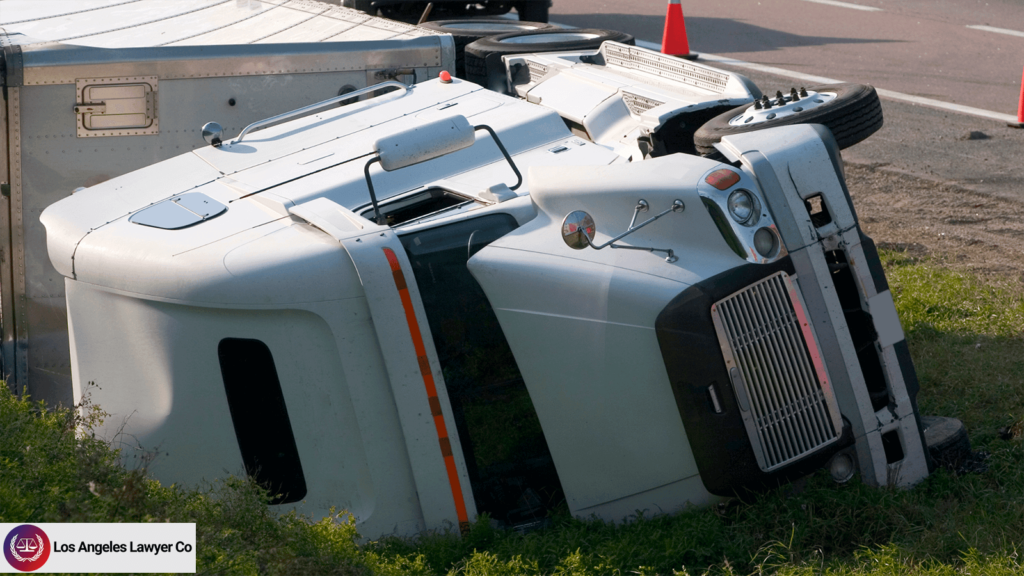10 Common Truck Accident Causes ( Driver-related and Non-Related)
Driver Fatigue
Driving Under the Influence of Intoxications
Reckless Driving
Distracted Driving
Inadequate Vehicle Upkeep
Poor Cargo Loading
Road Conditions
Weather Conditions
Unrealistic Time Pressures
Inadequate Driver Training
What Are the Types of Truck Accidents?
Rollover Accidents
Jackknife Accidents
Wide Turn or “Squeeze Play” Accidents
Underride Accidents
T-Bone Accidents
Blind Spot Accidents
Truck Tire Blowouts
Rear-End Truck Accidents
Head-On Truck Accidents
Brake Failure Accidents
How to deal with a Truck Accident?
Get Your Legal Advocacy with Los Angeles Truck Accident Lawyers
If you’ve encountered a truck accident, get the support of our best truck accident lawyers who can claim your rights. Our legal experts have litigation experience and have represented clients across diverse truck collision cases. We offer a free consultation and charge fee once your case is successfully resolved. Contact us today to directly discuss your case with our qualified attorney and obtain the diligent professional attention you deserve.
Bottom Line
FAGs
After a truck accident, prioritize safety by moving to a safe location if possible. Check for injuries and seek medical attention for yourself and others if necessary. Contact the police to report the accident and exchange information with the truck driver. Document the scene, gather witness information, and take photos if possible. Notify your insurance company, but be cautious when discussing details. Consult an attorney for legal guidance.
In case of a truck driver accident, the driver should follow safety protocols, like checking for injuries and reporting the accident to their employer and the authorities. The trucking company may conduct an internal investigation. If the accident was the driver’s fault, they could face legal consequences and potential job repercussions.
Semi trucks are involved in a significant number of accidents, but the exact figures vary from year to year and region to region. The Federal Motor Carrier Safety Administration (FMCSA) tracks these statistics, and factors like driver behavior, road conditions, and truck maintenance can influence accident rates.
After a truck accident, legal actions can include filing a personal injury claim or lawsuit against the truck driver, their employer, or other parties if negligence is involved. You can seek compensation for medical expenses, property damage, pain, suffering, and other losses. Consult with a personal injury attorney to explore your legal options.
Truck accident injuries tend to be more serious than those in other car accidents due to the sheer size and weight of truck-s. Trucks can weigh 20-30 times more than an average car, leading to greater impact forces. This can result in more severe injuries and damage to smaller vehicles involved in the accident.
A company can be liable after a truck crash if it employs the truck driver and the driver’s negligence or actions within the scope of their employment contributed to the accident. Additionally, if the company failed to properly maintain the truck, ensure driver qualifications, or violated safety regulations, they may be held liable for the accident.
If you are partly at fault in a truck accident, your ability to seek compensation may depend on the laws of your jurisdiction. In some states, you can still recover damages, but they may be reduced based on your level of fault. In others, a doctrine called “contributory negligence” may prevent recovery if you are found even partially at fault.
No, it’s not necessarily true that there’s no liability on the trucker if a truck jackknifes. Jackknifing can occur due to various factors, including driver error, poor road conditions, or equipment failure. If the trucker’s negligence, such as speeding or sudden braking, contributes to the jackknife accident, they may still be held liable for resulting damages and injuries. Liability depends on the specific circumstances of the accident.



